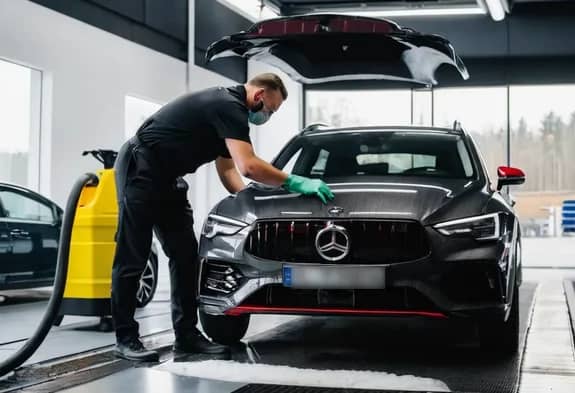Electric vehicles (EVs) do not require carbon cleaners as they do not produce carbon emissions during operation. Unlike internal combustion engine vehicles that burn fossil fuels and emit carbon dioxide and other pollutants, EVs run on electricity and produce zero tailpipe emissions. This characteristic of EVs makes them more environmentally friendly and contributes to reducing air pollution and combating climate change.
However, in case you haven’t switched from traditional vehicles to Electric vehicles, this article will focus on everything related to Spray Carbon Cleaner.
As cars rack up mileage, a buildup of carbon and soot inside the engine is inevitable. These deposits restrict airflow, reduce combustion efficiency and rob your engine of power. But there’s good news – a simple service called carbon cleaning can restore lost performance and improve fuel economy. Keep reading to learn how spray carbon cleaners work their magic.
The Causes and Effects of Carbon Buildup Carbon deposits come from two main sources. Partially burned fuel leaves behind carbon residue, as do oil vapors seeping past worn piston rings and valve seals. These deposits coat intake valves, combustion chambers, exhaust ports and oxygen sensors. Over time, engines lose power and run less efficiently.
Symptoms of excessive carbon buildup include:
Carbon buildup isn’t just annoying, it’s expensive. Clogged sensors and valves can fail, costing hundreds for repairs. Fuel waste penalizes your wallet at every fill up. And ignoring check engine lights risks further damage.
Fortunately, carbon cleaning offers an easy fix to restore lost horsepower and fuel efficiency.

Spray cleaners use a carefully formulated solvent to dissolve and remove carbon deposits. Technicians insert a special wand into the air intake and spray the solution while the engine is running. It flows through the system, releasing carbon so it can burn away through normal combustion. The cleaning process takes 30-90 minutes depending on the level of buildup.
Here are some key advantages of spray cleaning:
Customers report smoother running, increased power and 1-3 mpg fuel economy gains after a simple spray cleaning service. It’s one of the most cost effective ways to enhance performance and longevity.
Don’t just take our word that carbon cleaning works – hear from actual customers about their experiences using Carbon Off spray:
Joel had some old, encrusted stainless steel pans that other cleaners couldn’t touch. He reports Carbon Off “loosened the carbon with very little elbow grease” allowing him to restore the cookware to likenew condition. He was so impressed that he did “research to find a chemical that would loosen the bonds between the baked-on carbon and the metal.” For tough cleaning jobs, Carbon Off outperformed the competition.
Another customer used it to clean her stove burners, saying “Oily splatters on my stove burners set as brown, hard to remove spots. I take the burners off, and spray them with this product. A quick wipe a few minutes later leaves them clean.” Stovetops see a lot of high-heat cooking, making them prone to carbon buildup. Carbon Off provided an easy fix.
Liz had a heavily encrusted pan that she could not clean with other products like baking soda or vinegar. Carbon Off dissolved the deposits, allowing her to “see the results in the pics and video” of a dramatically cleaned pan. Though it requires using caution with ventilation, it tackled a job other cleaners could not touch.
While the cleaning power gets rave reviews, some customers report issues with the spray can nozzle clogging. One said “the nozzle on the can hardly worked from the start” while another had cans stop spraying mid-use. Consider the liquid formula to avoid any potential clogging. But for serious cleaning challenges, Carbon Off removes the most stubborn deposits with minimal effort. The before and after results speak for themselves.
Follow these tips to safely maximize Carbon Off’s cleaning effectiveness:
While Carbon Off makes the cleaning easy, be sure to take proper precautions. The powerful formula requires care in handling. But used properly, it can take on the toughest baked-on carbon and restore your gear.
Give your equipment new life and keep your engine running clean. Carbon cleaners like Carbon Off help prevent costly repairs and wasted fuel while making your car or kitchen sparkle. Don’t tolerate buildup and pollution – fight back with carbon cleaning. Your engine, air and cooking will thank you.
All gasoline and diesel powered vehicles develop carbon deposits. But some are more prone to heavy buildup based on engine design and driving patterns. Here are prime candidates for carbon cleaning:
The experts recommend carbon cleaning services every 20,000-50,000 miles as preventive maintenance based on your driving habits and conditions. For high-carbon engines, more frequent cleanings help maximize efficiency and component life. Be sure to use quality fuels and oils to slow re-formation of deposits after service.
Carbon cleaning is a simple process, but following some basic guidelines will make your service visit quick and easy:
Beyond driver benefits, carbon cleaning helps the environment. Engines running rich due to carbon buildup waste fuel and emit higher levels of hydrocarbons, particulate matter and other pollution.
Studies show regular carbon cleaning can reduce emissions by 50% or more. Keeping engines running at peak efficiency is a simple way we can all contribute to cleaner air – one less cloud of black smoke matters.
Investing in carbon cleaning pays dividends through improved performance, fuel savings and reduced maintenance costs. It’s green for your wallet and the environment. Simply put, clean engines run better, last longer and pollute less. Talk to your trusted repair shop about scheduling carbon cleaning service. Your engine and air quality will thank you.